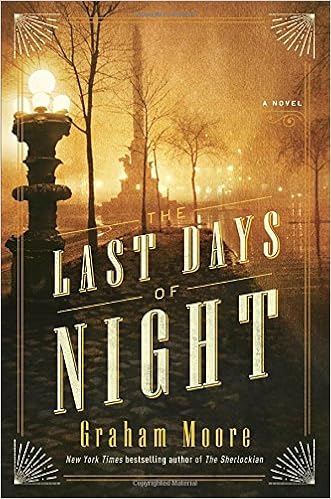Last Days of Night is a novel that really is a biography of a young lawyer who works for George Westinghouse, and through it meets Thomas Edison and Nikola Tesla, among others. It was interesting to me to learn more about these legendary people. I associate them with things like light bulbs and inventions, but this made them real people.
 We read this book in my book club and one of the members pointed out that there is a section in back where the author talks about what parts of the book are true, based on reports from the time, and those where he imagined what scenes were, and places where he either changed the order or combined things that happened at different times, and so on. I was glad to know that. As I read those notes, they seemed to point out that, really, the book is good history - the changes made it a story, a novel, instead of a textbook.
We read this book in my book club and one of the members pointed out that there is a section in back where the author talks about what parts of the book are true, based on reports from the time, and those where he imagined what scenes were, and places where he either changed the order or combined things that happened at different times, and so on. I was glad to know that. As I read those notes, they seemed to point out that, really, the book is good history - the changes made it a story, a novel, instead of a textbook.I liked the quotes at the beginning of each chapter. They were often by Bill Gates and Steve Jobs and others of that ilk. It was interesting to read again Thomas Edison's quote "I have not failed. I've just found ten thousand ways that don't work." But one of Tesla's issues with Edison was that when he was working in Edison's lab, they would have to experiment over and over and Tesla found that a waste of time. He felt he could determine if something would or would not work through, I think, exploring it thoroughly in his mind, and he didn't need to do all that actual experimenting.
 The main character is a lawyer named Paul Cravath. He is based on a real person, too. Paul becomes employed by George Westinghouse pretty much straight out of law school. Westinghouse is suing Edison for the light bulb patent. The courts keep ruling that Edison invented the light bulb and Westinghouse improved it, but Westinghouse believes he truly invented something new, not just an improvement.
The main character is a lawyer named Paul Cravath. He is based on a real person, too. Paul becomes employed by George Westinghouse pretty much straight out of law school. Westinghouse is suing Edison for the light bulb patent. The courts keep ruling that Edison invented the light bulb and Westinghouse improved it, but Westinghouse believes he truly invented something new, not just an improvement.There was also a big hullabaloo about DC and AC. I had no idea! Direct current and alternating current were big concepts that had a lot to do with safety and costs and what worked over a distance and therefore what made sense to provide electricity for cities, and from there, everything else. In that fight, the invention of the electric chair was a tool to prove a point. The description of the first use of an electric chair is just horrific. And to think we are still figuring out if that is cruel and unusual punishment or not.
Here's a good passage that helps illustrate how the book is historical and you can learn a lot, yet it's a story, it keeps your interest, and it's characters "acting" to tell the story, not a textbook.
"I am being sued." [George Westinghouse]This book is a good story. Even if you, like me, have no special interest in learning about electricity, Thomas Edison, or Westinghouse, you'll enjoy the book for the story. Good writing, good plot, good characters.
Paul was well aware. In the time since his invitation to dinner, he'd devoured all the newspaper accounts of Westinghouse's legal troubles. The dispute was highly public. "Thomas Edison has sued you for infringing on his patent on the incandescent light bulb."
"Edison's bulbs are terrible--poor-quality designs, two generations behind mine. There are a dozen companies across this country making bulbs of more advanced design than Edison's. Mine just happen to be by far the best."
"Yours are better. But Edison's were first. It's the latter issue that is of legal concern. Your difficulty is that he's the one with the patent."
"I did not copy Edison's design for the light bulb. I improved upon it. Tremendously. My light bulb is to his as a motor wagon is to a horse-drawn carriage. Would there be justice in forbidding Mr. Benz from selling the former because of the existence of the latter? Of course not. Edison is not suing me--he is suing progress itself because he lacks the ability to invent it."
"It sounds," suggested Paul, "as if you're in need of a very good attorney."

No comments:
Post a Comment